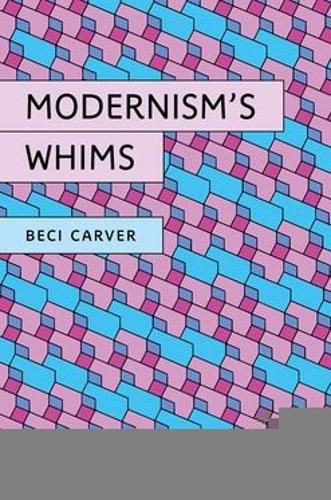Readings Newsletter
Become a Readings Member to make your shopping experience even easier.
Sign in or sign up for free!
You’re not far away from qualifying for FREE standard shipping within Australia
You’ve qualified for FREE standard shipping within Australia
The cart is loading…






Thomas Hardy asks of the ghost stalking him: 'Whither, O whither will your whim now draw me?' Immediately tripping up on its own laid-out comma, then pausing to howl theatrically, and hedging its bets with a stuttering, archaic 'whither' that sceptically hovers between 'where' and 'whether', this line has already begun to worry about where it is going or being 'whim-drawn.' On the other hand, it enjoys its worry, over-performs the conundrum. It is a whim addressing a whim.
Beci Carver's Modernism's Whims is a book about whims; their tyrannies, arbitrariness, ultimate frivolity: how they may feel urgent for all their lightness, while still letting you play, letting you go, letting you off the hook. The book is at once a meditation on the whim as a phenomenon and an endeavour to track the specific (albeit necessarily intangible) literary whims of four modernist writers: Hardy, T. S. Eliot, William Empson, Elsie Elizabeth Phare. Moving counter to the otherwise professionalised spirit of modernism, these literary whims and their author sponsors are imagined to occupy a fugitive position within the broader movement, their progress dangerously silly. Carver situates modernism after whim's Golden Age in the mid-nineteenth century, at a literary-historical moment when authors were expected to know what they were about. Hardy's stalker ghost is on the run.
$9.00 standard shipping within Australia
FREE standard shipping within Australia for orders over $100.00
Express & International shipping calculated at checkout
Thomas Hardy asks of the ghost stalking him: 'Whither, O whither will your whim now draw me?' Immediately tripping up on its own laid-out comma, then pausing to howl theatrically, and hedging its bets with a stuttering, archaic 'whither' that sceptically hovers between 'where' and 'whether', this line has already begun to worry about where it is going or being 'whim-drawn.' On the other hand, it enjoys its worry, over-performs the conundrum. It is a whim addressing a whim.
Beci Carver's Modernism's Whims is a book about whims; their tyrannies, arbitrariness, ultimate frivolity: how they may feel urgent for all their lightness, while still letting you play, letting you go, letting you off the hook. The book is at once a meditation on the whim as a phenomenon and an endeavour to track the specific (albeit necessarily intangible) literary whims of four modernist writers: Hardy, T. S. Eliot, William Empson, Elsie Elizabeth Phare. Moving counter to the otherwise professionalised spirit of modernism, these literary whims and their author sponsors are imagined to occupy a fugitive position within the broader movement, their progress dangerously silly. Carver situates modernism after whim's Golden Age in the mid-nineteenth century, at a literary-historical moment when authors were expected to know what they were about. Hardy's stalker ghost is on the run.